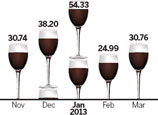
 |
| Property agents advertise cheap housing, many being shared units in an apartment, outside the Tiantongyuan residential community in Beijing's northern suburbs. tan qing / for China Daily |
No easy solution
Both Li at Beijing University of Technology and Xiong with Ziroom agreed solving the problem of illegally shared housing will not be easy, especially while demand for cheap accommodation is so high.
Subletting is filling a gap, Li conceded.
"There is no firm data that show there is a lack of low-cost rental properties, but there are definitely far too few within Fifth Ring Road," he said.
"If there was enough, there would be little opportunity for subletters."
However, the two differ when it comes to creating high-capacity shared houses from large, empty properties in Beijing.
Xiong argued that with a proper design that removes hidden dangers, it would be OK for a house or apartment to have six to eight people to a room.
"Make the rooms small and safe," he said. "And make sure tenants are registered with the public security bureau."
Even with official supervision, Li said he still sees problems with large-occupancy properties being mixed in among residential communities, such as noise and environmental deterioration.
A receptionist who answered the Mayor's Hotline said city authorities regularly receive complaints about excessive noise or water leaks coming from illegally shared housing.
Li suggested apartments larger than 20 sq m set in a designated area should be included into the city's urban development plan.
"The government needs to find a way to provide more low-cost housing for lease," he added.


















 China builds 'world's tallest building'
China builds 'world's tallest building'


![]()
